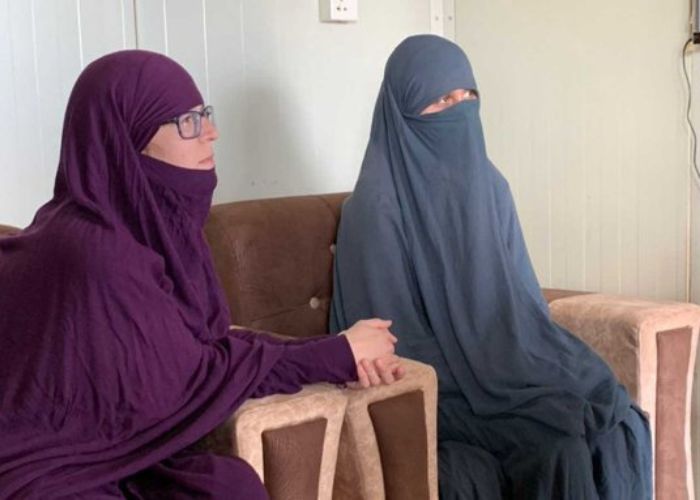MADRID – Two of the Spanish women who are wives and widows of Islamic State (ISIS) jihadists who had been interned in detention camps under the control of Kurdish militias in northern Syria arrived in Spain on Monday evening.
Sources familiar with the repatriation process report this. The two women and 13 children arrived at Torrejón de Ardoz military airport in Madrid. Their families were not allowed to approach. Moreover, communication problems have prevented the repatriation of a third Spanish woman from northeastern Syria.
Thirteen minors
The two women are Yolanda Martínez, 37, and Luna Fernández, 34. According to the same sources, they travelled with 13 minors. Yolanda Martínez has four children, while Luna Fernández is the mother of five children. Her eldest, aged 15, was separated from his mother and committed to a correctional institution. In addition, Martínez took care of four other orphans who were met by their grandparents.
According to the families’ lawyer, the two women have been arrested. They will make a statement to the police on Tuesday before going to court. The children have already been placed with social services.
Risky situation in Syrian camps
The State Department stated that the National Court “will proceed to legalise the procedural situation” of the women. The operation took several months “because of the complexity and the high-risk situation of the Syrian camps”.
As announced in November, at the end of the year the government took final steps to repatriate the 4 women and 17 children and adolescents. The youngest was born in captivity and is only 3 years old. The rest of the minors have roots in Spain. However, they have been held in the custody of Kurdish militias since the defeat of ISIS in its last stronghold of Baguz in March 2019.
Four women located
A month later, an El País journalist managed to locate the women in northeastern Syria. Lubna Miludi, 29, and Loubna Fares, 43, were in Northern Syria with Martínez and Fernández, the latter of Moroccan nationality but with children of a Spanish jihadist.
The women and children repatriated on Monday were held in the Al Roj detention camp in northeastern Syria. This is along the border with Turkey. This camp, houses 2,000 people linked to ISIS, and is more accessible. It therefore allowes Spanish authorities to speed up the repatriation process.
Lubna Miludi is the fourth inmate. She was born in Ceuta, and is with her seven-year-old son in a camp south of Al Hol. Tvery close to the Iraqi border. About 60,000 people live in Al Hol, including foreigners, Syrians and Iraqis. According to the families’ lawyer, it has not yet been possible to arrange Miludi’s repatriation due to communication problems.
These centres, where women and children are held indefinitely without judicial control, have become new guantánamos in the middle of the Syrian desert. The three women of Spanish nationality had asked to return to Spain with the minors in their care.
The fourth inmate, Loubna Fares, a Moroccan widow of Spanish jihadist of Iranian descent Navid Sanati, escaped from the Al Hol camp with her three children in February 2020. Since then, her residence camp has been unknown. Sanati’s family has stated in a recent conversation with El País that they do not know the whereabouts of the four.
Guardianship of minors
The families of the repatriates want to take over custody of the minors. They have fought them through the courts, politics and the media for over three years to bring about the return of the children. The social services will now have to assess the process.
Investigation into ties to a jihadist cell
The repatriation process of women is coordinated by the Ministry of Foreign Affairs together with the Ministries of the Interior, Defence, Social Rights and Justice. The women will appear before the National Court. There is an ongoing investigation into their ties to the jihadist cell Brigade Al Andalus, to which their husbands would belong. They could be accused of taking up residence in a foreign territory controlled by a terrorist organisation to cooperate with it. According to the Penal Code, that crime carries a prison sentence of up to five years.
The foursome defend that they travelled to the caliphate by their husbands in 2014 and did not fight or participate in any jihadist actions.
“With this operation, Spain joins its European neighbours (including Germany, Belgium, Norway, Ireland, Sweden, Italy, Finland, and the Netherlands). (…) Spain complies with its legal obligations, including those derived from international treaties,” said the ministry led by José Manuel Albares.
Spain initially refused repatriation
The government has so far refused to repatriate its citizens. Conseqently, the situation has evolved in recent months. Spain was alone in its refusal, as the vast majority of EU countries have repatriated, at least in part, their citizens. In July, an estimated 154 European women, including Spanish women, were in camps in northeastern Syria.


